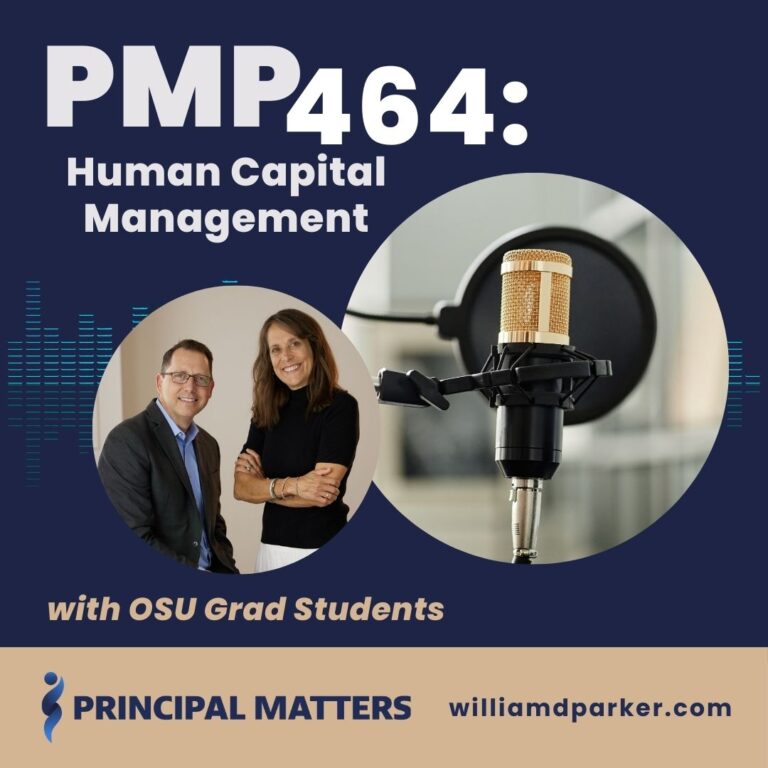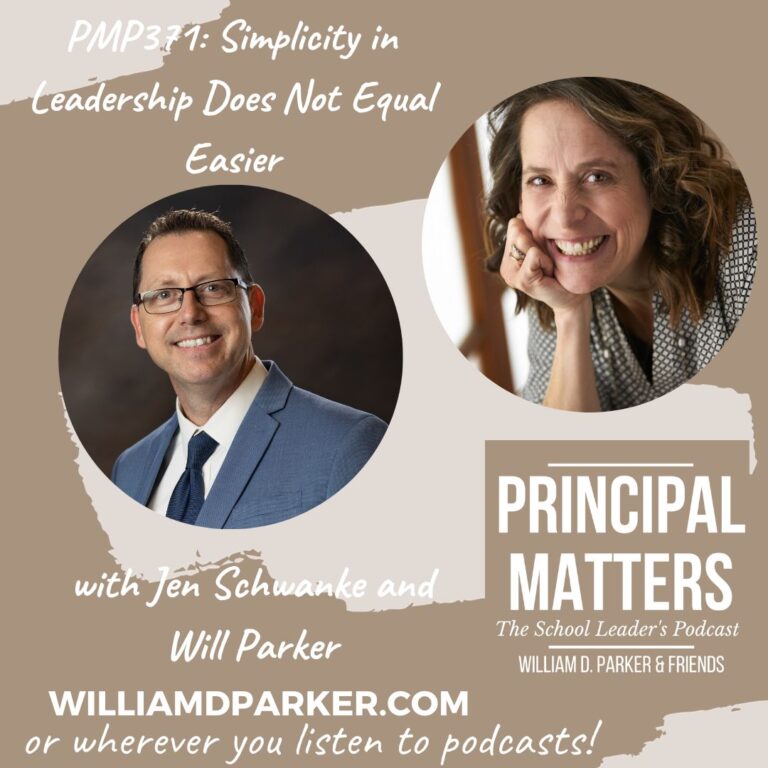Podcast: Play in new window | Download
This past month, we sent our third daughter to college. More than a year ago, she began to explore the possibility of studying abroad. As a result of months of apply to schools, virtual meet-ups, and 5,000 miles of travel, she is now a student at Aberystwyth University in Wales.
Sending off another Parker child has been an emotional roller coaster. But the experience also brought back some memories of the first time we sent a child to college. As I was walking down memory lane this week, I came across a post I had shared in 2017 about the cycles of self-reflection and applying those lessons both in parenting and in personal growth.
This week, I’ve decided to re-share that content here in an encore episode. Listening back also made me realize I originally shared this post in the spring of my last year as a high school principal. At the time, I had no idea I would be offered an opportunity to move into full-time work serving principals in my own state as well as across the globe with my books and trainings.
Listening back has been bitter-sweet, but it has also been a great reminder that growth is a ongoing cycle of learning, reflecting, refining, and action.
I hope you enjoy this repeat podcast episode and can apply it to your own journey:
——————————————————-
March 2017: A couple of weeks ago, my wife and I took our oldest daughter, Emily, out to dinner. She turned 18 this year, and we wanted to encourage her in the opportunities and challenges she will be facing as a graduating senior and soon-to-be college student.
Previously, I had been reading Tim Elmore’s Generation iY where he shares about three intelligences that help us in conversations with our students and children as they mature:
Emotional intelligence: We need to help them develop their EQ—self awareness, self-management, social awareness, and relationship management.
Moral intelligence: We need to coach them toward robust character—personal discipline, secure sense of self, strong positive values. (Perhaps we could call this MQ.)
Leadership intelligence: Finally, we need to encourage clear vision, courage, priorities, big-picture perspective, and planning skills (LQ) (Elmore 209).
During dinner, I asked Emily if I could read through the descriptions and if she could reflect on areas she felt were her strengths and where she thought she still needed to grow. As she self-reflected on different areas, I learned some new insights about her. And I think she may have learned some new insights about herself too.
My Own Self-Assessment
Self-reflection isn’t only good for our children as they grow. It’s good for older learners like you and me. I remember about five years ago when I was talking to a buddy who is twenty years younger than I. He was telling me about the goals he and his wife had set and reached. He was excited about being a young father, starting his own business, and pursuing his dreams. I began to reminisce with him about when I was his age—how my wife and I had paid off debts, bought our first house, started a family.
As he listened, he looked at me with a curious expression and asked, “So that was twenty years ago. What are your goals now?” Suddenly, I was stumped. I realized I didn’t have an answer, and as I stumbled around to find one, I finally looked at him and said, “You know. I think right now I’m just trying to survive.”
When I walked away from that conversation, I was haunted by my response. When was the last time I had self-reflected on new goals for my family and my future? In some ways, I had achieved a lot of my dreams in my career. But where did I want to grow from here?
A few weeks later, I was invited to a weekend men’s retreat with my church. It was a unique agenda: Instead of spending a day together in meetings or activities, our pastor asked us to spend time in solitude, self-reflection and prayer. He gave us a list of questions and goals, and among them these were some that I reflected on:
Reflections:
1. What were the major milestones of the past year (events)?
2. What were the major blessings?
3. Major victories?
4. Major defeats?
5. Major lessons learned?
Goals for this year:
Spiritual
Family
Social
Physical
Vocational
Are your personal goals also SMART goals?
Strategic and specific
Measurable
Attainable
Results-oriented
Time-based
Reflecting and praying about these goals was a great wake-up call for me. In fact, I’d say that was the launching pad for much of the content I have created over the last four years in my blog, books, and presentations. That day was a turning point because it challenged me to embrace a mindset of continuous growth.
To put it simply, self-reflection is a practice that can help you move from a “surviving” mentality to a “thriving” one. Ultimately, it also helps you reflect on how your life can benefit others in specific ways. We all have lots of room to grow, and I certainly haven’t maintained growth without difficulties, challenges or failures. But I can say that a significant shift occurs in your trajectory when you take time for self-reflection.
Teach, Reflect, Learn
If you haven’t thought about the power of self-reflection lately, let me recommend a great book by Pete Hall and Alisa Simeral: Teach, Reflect, Learn: Building Your Capacity for Success in the Classroom
Recently, I heard Pete Hall present lessons from the book, which included a description he calls the Reflective Cycle. He explained that our ability to grow is connected to our ability to honestly assess our strengths and weaknesses. And our ability to self-reflect involves a continuum of four stages (my takeaways in parenthesis):
1. Unaware Stage(the inability too see or lack of sensitivity to our own practices—good or bad).
2. Conscious Stage(the recognition of our habits, progress—or lack of progress—and a realization of the implications)
3. Action Stage(moving forward armed with new information, new action-steps, new accountability, and a new commitment to trial-error for improvement)
4. Refinement Stage(repeating what works, thinking ahead, collaborating with others, and planning with this new knowledge or practice in mind)
Pete shared an amazing video clip from a teacher on YouTube reflecting on his own teaching practice. In that short spot, this young teacher went from describing his most incredible teaching moment to also acknowledging where he still had room to grow. He went from a “Wow, I’m awesome” moment to an “Uh-oh, I still have tons to learn” moment. It was a great example of how we can practice the reflective cycle even in the times when we think our practice is profoundly effective.
Pete concluded: “Beware of the traveler who thinks he has arrived.” In other words, we endanger effectiveness when we simply do what worked before without really analyzing our motivations or outcomes.
So here are some questions to think about this week:
- When is the last time you have walked through a reflective cycle about your own practices?
- When is the last time you assessed your own strengths and weaknesses as an educator, leader, spouse, parent, etc.?
- If there is a direct correlation between our self-awareness and our ability to help others, how can you explore your own motivations, and how can you guide, coach, or help others with theirs?
Let’s Wrap This Up
During the special dinner with my oldest daughter, my wife and I took turns telling her ways we’ve seen her flourish as she’s grown up. And we encouraged her to keep growing in other areas. Then my wife gave her a beautiful necklace as a way to remember the occasion.
Later that night as my wife I were talking alone, we talked about the pleasure of watching our girl becoming a young woman. As proud as I am of her, she still has years ahead of her to grow. And like me, she will experience lots of ups and downs.
But in the process, my hope is that by modeling self-reflection for her (and with her), she can begin seeing the benefits of understanding her own EQ, MQ, and LQ now. In the process, she may also make wiser choices for the days ahead–choices I’m hoping will be focused on how she can, in turn, help others.
Now It’s Your Turn
What is one step you can take today to move toward a conscious awareness of where you may still have room to grow? Then what are some ways you help others do the same? Take time to reflect on the some of the questions shared above. If you’re preparing for a break soon (we’re getting ready for Spring Break at the time of this post), how can you include self-reflection as a way to recharge your batteries for the rest of the semester?



